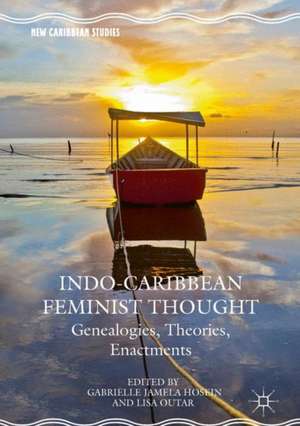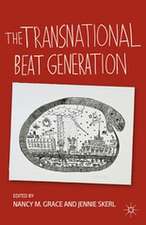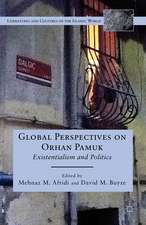Indo-Caribbean Feminist Thought: Genealogies, Theories, Enactments: New Caribbean Studies
Editat de Gabrielle Jamela Hosein, Lisa Outaren Limba Engleză Paperback – 30 iun 2019
| Toate formatele și edițiile | Preț | Express |
|---|---|---|
| Paperback (1) | 217.62 lei 43-57 zile | |
| Palgrave Macmillan US – 30 iun 2019 | 217.62 lei 43-57 zile | |
| Hardback (1) | 591.93 lei 43-57 zile | |
| Palgrave Macmillan US – 30 noi 2016 | 591.93 lei 43-57 zile |
Din seria New Caribbean Studies
-
 Preț: 398.35 lei
Preț: 398.35 lei -
 Preț: 386.81 lei
Preț: 386.81 lei -
 Preț: 388.72 lei
Preț: 388.72 lei -
 Preț: 385.84 lei
Preț: 385.84 lei -
 Preț: 384.86 lei
Preț: 384.86 lei -
 Preț: 386.22 lei
Preț: 386.22 lei -
 Preț: 389.70 lei
Preț: 389.70 lei -
 Preț: 388.72 lei
Preț: 388.72 lei -
 Preț: 389.70 lei
Preț: 389.70 lei -
 Preț: 389.96 lei
Preț: 389.96 lei -
 Preț: 387.75 lei
Preț: 387.75 lei -
 Preț: 213.05 lei
Preț: 213.05 lei - 15%
 Preț: 590.63 lei
Preț: 590.63 lei -
 Preț: 210.16 lei
Preț: 210.16 lei - 15%
 Preț: 639.56 lei
Preț: 639.56 lei - 15%
 Preț: 584.76 lei
Preț: 584.76 lei -
 Preț: 449.74 lei
Preț: 449.74 lei - 15%
 Preț: 697.32 lei
Preț: 697.32 lei - 15%
 Preț: 501.24 lei
Preț: 501.24 lei - 15%
 Preț: 693.71 lei
Preț: 693.71 lei - 15%
 Preț: 695.85 lei
Preț: 695.85 lei - 15%
 Preț: 702.05 lei
Preț: 702.05 lei
Preț: 217.62 lei
Nou
Puncte Express: 326
Preț estimativ în valută:
41.64€ • 43.59$ • 34.66£
41.64€ • 43.59$ • 34.66£
Carte tipărită la comandă
Livrare economică 31 martie-14 aprilie
Preluare comenzi: 021 569.72.76
Specificații
ISBN-13: 9781349720361
ISBN-10: 1349720364
Ilustrații: XIII, 349 p. 10 illus., 9 illus. in color.
Dimensiuni: 148 x 210 mm
Greutate: 0.44 kg
Ediția:1st ed. 2016
Editura: Palgrave Macmillan US
Colecția Palgrave Macmillan
Seria New Caribbean Studies
Locul publicării:New York, United States
ISBN-10: 1349720364
Ilustrații: XIII, 349 p. 10 illus., 9 illus. in color.
Dimensiuni: 148 x 210 mm
Greutate: 0.44 kg
Ediția:1st ed. 2016
Editura: Palgrave Macmillan US
Colecția Palgrave Macmillan
Seria New Caribbean Studies
Locul publicării:New York, United States
Cuprins
Gabrielle Jamela Hosein and Lisa Outar, “Introduction: Interrogating an Indo-Caribbean Feminist Epistemology”.- Part 1: Tracing the Emergence of Indo-Caribbean Feminist Perspectives.- Patricia Mohammed, “A Vindication for Indo-Caribbean Feminism”.- Preeia D. Surajbali, “Indo-Caribbean Feminist Epistemology: A Personal and Scholarly Journey”.- Andil Gosine, “My Mother’s Baby: Wrecking Work after Indentureship”.- Part 2: Transgressive Storytelling.- Alison Klein, “‘Seeing Greater Distances’: An Interview with Peggy Mohan on the Voyages of Indo-Caribbean Women”.- Anita Baksh,“Indentureship, Land, and Indo-Caribbean Feminist Thought in the Literature of Rajkumari Singh and Mahadai Das”.- Lisa Outar, “Post-Indentureship Cosmopolitan Feminism: Indo-Caribbean and Indo-Mauritian Women’s Writing and the Public Sphere”.- Tuli Chatterji, “‘Mini Death and a Rebirth’: Talking the Crossing in Shani Mootoo’s Moving Forward Sideways Like a Crab”.- Part 3:Art, Archives and Cultural Practices.- Kavita Ashana Singh, “Comparative Caribbean Feminisms: Jahaji Bhain in Carnival”.- Krystal Nandini Ghisyawan, “Unsettling the Politics of Identity and Sexuality Among Same-Sex Loving Indo-Trinidadian Women”.- Angelique V. Nixon, “Seeing Difference: Visual Feminist Praxis, Identity and Desire in Indo-Caribbean Women’s Art and Knowledge”.- Lisa Outar, “Art, Violence and Non-Return: An Interview with Guadeloupean Artist Kelly Sinnapah Mary”.- Part 4: Dougla Feminisms.- Gabrielle Jamela Hosein, “Dougla Poetics and Politics in Indian Feminist Thought: Reflection and Reconceptualization”.- Sue Ann Barratt, “Nicki Minaj, Indian In/Visibility and the Paradox of Dougla Feminism”.- Kaneesha Cherelle Parsard, “Cutlass: Objects Toward a Dougla Feminist Theory of Representation”.- Part 5: New Masculinities and Femininities.- Rhoda Reddock, “Indo-Caribbean Masculinities and Indo-Caribbean Feminisms: Where are We Now?”.- Michael Niblett, “Belaboring Masculinity: Ecology, Work, and the Body in Michel Ponnamah’s Dérive de Josaphat”.- Stephanie L. Jackson, “From Stigma to Shakti: The Politics of Indo-Guyanese Women’s Trance and the Transformative Potentials of Ecstatic Goddess Worship in New York City”.- Epilogue, Shalini Puri.- Postscript, Shivanee M. Ramlochan.- Notes on Contributors.- Index.
Notă biografică
Gabrielle Jamela Hosein is Head of the Institute for Gender and Development Studies at The University of the West Indies, St. Augustine, Trinidad and Tobago. She is Associate Editor of The Caribbean Review of Gender Studies. She works in the areas of politics and governance and Caribbean feminism. Her column, Diary of a Mothering Worker, is published weekly in the Trinidad Guardian.
Lisa Outar is an Independent Scholar who researches Anglophone and Francophone Caribbean literature. She publishes in the areas of Indo-Caribbean literature, feminist writing, and the connections between the Caribbean and other sites of the indentureship diaspora. She serves as an editor of the Journal of West Indian Literature.
Lisa Outar is an Independent Scholar who researches Anglophone and Francophone Caribbean literature. She publishes in the areas of Indo-Caribbean literature, feminist writing, and the connections between the Caribbean and other sites of the indentureship diaspora. She serves as an editor of the Journal of West Indian Literature.
Textul de pe ultima copertă
Bringing together three generations of scholars, thinkers and activists, this book is the first to trace a genealogy of the specific contributions Indo-Caribbean women have made to Caribbean feminist epistemology and knowledge production. Challenging the centrality of India in considerations of the forms that Indo-Caribbean feminist thought and praxis have taken, the authors turn instead to the terrain of gender negotiations among Caribbean men and women within and across racial, class, religious, and political affiliations. Addressing the specific conditions which emerged within the region and highlighting the cross-racial solidarities and the challenges to narratives of purity that have been constitutive of Indo-Caribbean feminist thought, this collection connects to the broader indentureship diaspora and what can be considered post-indentureship feminist thought. Through examinations of literature, activism, art, biography, scholarship and public sphere practices, the collection highlights the complexity and richness of Indo-Caribbean engagements with feminism and social justice.
Caracteristici
Offers a unique and ground-breaking portrait of the contributions of Indo-Caribbean women to feminist epistemology. Foregrounds the complexity of Indo-Caribbean feminist thought by considering gender relations through a range of disciplines including literature, activism, art and public sphere practices. Sheds light on the relationship between Caribbean feminisms and those emerging across the indentureship diaspora.














